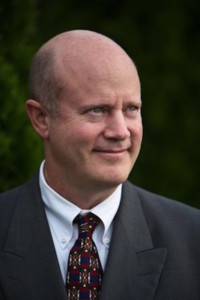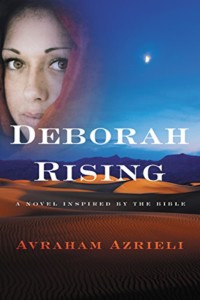Title: Deborah Rising: A Novel Inspired by the Bible
Author: Avraham Azrieli
Publisher: HarperLegend
ISBN: 9780062563552
Pages: 224
Genre: Literary / Religious
Author Interview with Avraham Azrieli
Interviewed by: John Murray
About the Author
 A visit to the archeological remains of the ancient city of Shiloh in the Samariah Hills (about 25 miles east of modern-day Tel Aviv) fueled my imagination about an enigmatic gap in the dramatic story of the first woman to lead any nation in recorded human history: Deborah. While the Book of Judges describes Deborah’s stunning success as a prophet, a judge and a military leader who liberated the Israelites from Canaanite oppression, there is no information about her family, upbringing and youth. How could a girl, growing up in a world controlled by men, rise to rule over them? What hardship forged her formidable tenacity? What setbacks hardened her resilience? What challenges honed her skills? These are the fascinating mysteries I attempt to unravel by telling Deborah’s story in this novel and its sequels.
A visit to the archeological remains of the ancient city of Shiloh in the Samariah Hills (about 25 miles east of modern-day Tel Aviv) fueled my imagination about an enigmatic gap in the dramatic story of the first woman to lead any nation in recorded human history: Deborah. While the Book of Judges describes Deborah’s stunning success as a prophet, a judge and a military leader who liberated the Israelites from Canaanite oppression, there is no information about her family, upbringing and youth. How could a girl, growing up in a world controlled by men, rise to rule over them? What hardship forged her formidable tenacity? What setbacks hardened her resilience? What challenges honed her skills? These are the fascinating mysteries I attempt to unravel by telling Deborah’s story in this novel and its sequels.
Today we are talking with author Avraham Azrieli of “Deborah Rising: A Novel Inspired by the Bible.”
PBR: How did you become involved with the idea of writing about Deborah?
My roots are in Israel, where I grew up and enjoyed a wonderful education, rich with history and love for that fascinating land and its glorious past. Since relocating to the United States, I’ve continued to read a great deal of historical and archeological books and articles as more and more new discoveries are made. More specifically, as I described in the Acknowledgments section of the book, a visit to the archeological remains of the ancient city of Shiloh in the Samariah Hills (about 25 miles east of modern-day Tel Aviv) fueled my imagination about an enigmatic gap in the dramatic story of the first woman to lead any nation in recorded human history: Deborah. The Book of Judges describes Deborah’s stunning success as a prophet, a judge and a military leader who liberated the Israelites from Canaanite oppression, but there is no information about her family, upbringing and youth. How could a girl, growing up in a world controlled by men, rise to rule over them? What hardship forged her formidable tenacity? What setbacks hardened her resilience? What challenges honed her skills? These are the fascinating mysteries I attempt to unravel by telling Deborah’s story in this novel and its sequels.
PBR: What’s the most difficult thing about writing characters of the opposite sex?
Writing about someone of the opposite gender is definitely challenging, particularly for a man writing about a young woman, who confronts physical, emotional and social challenges that most men don’t comprehend. Add to this the age difference, the completely alien reality of the ancient world, and the difficulties mount higher—as well as the creative joys! I’m very fortunate to be surrounded by bright and insightful women—my wife, daughter, mother, and sisters—who collectively never cease to educate me—and surprise me. I seek their advice, especially when writing about a female character. Later on in the writing process, when they read the manuscript in its various stages, I benefit from their astute comments. As a writer, what drives me is the belief in in the strength and resilience of people, and writing Deborah’s story offered an opportunity to explore one of the most fascinating historical figures—a young woman who, against all odds, rose to the top and led her nation in antiquity, over a thousand years before Cleopatra!
PBR: What reservations did you have about fictionalizing Deborah’s life story and how did you overcome those?
I always have confidence in my readers’ ability to suspend disbelief with respect to the parts of the story that must be fictionalized – because we don’t know the facts. My job is to make sure that the facts surrounding the drama are as accurate as possible. It takes time for me to create a ‘living’ character in my mind, and I do have strong reservations about starting to write a story if the character isn’t ‘speaking’ to me clearly. But once she is fully ‘alive,’ it’s not difficult to describe what I see her (or him) do, say, feel, and think. That’s the magic of writing fiction, and I love it. More specifically, the characters in Deborah Rising lived in Canaan over three thousand years ago, and because I’m dedicated to getting the facts right, a lot of research was needed to learn how people actually lived back then. Fortunately, I enjoy research very much, and I love to speculate how the characters would respond to various dramatic situations. Writing historical fiction that’s populated by a mix of real historical figures and fictional persons is wonderful because I’m constantly challenged by the need to balance: recreate their ancient way of life realistically while dramatizing the human conflicts in a way that would be emotionally meaningful for the modern reader.
PBR: What was your hardest scene to write?
Without giving away the most suspenseful parts of the book, I’d say that the hardest was to describe certain violent events in a way that was honest about how unjust and inhumane was the treatment of girls and women back then. I have a daughter myself, and it’s terrible to think what physical suffering and humiliating subjugation she would have endured had she lived during the biblical era I was writing about. And the most tragic fact is that, even today, despite all the international treaties, UN agencies, and global news organizations, in many parts of the world girls and women are treated worse than livestock and are deprived of any rights or liberties whatsoever. If Deborah’s story gives one girl the strength to overcome oppression—or gives one man the moral fortitude to stand up for women’s rights—then all the work I put into Deborah Rising was worthwhile.
PBR: What were your goals and intentions in this book, and how well do you feel you achieved them?
I can’t say honestly that I had preconceived goals, other than to write a good story that would be as fascinating to my readers as it fascinated me. But this is a unique story—describing the unlikely yet historically true rise to power of a young woman at the time when men had all the power. Without getting into contemporary politics, I feel it’s worth taking a moment to contemplate why is it that only now, in 2016, after over two centuries of United States elections, we finally have a woman as a viable candidate for president. My personal observation is simple: nations that deprive their women of equal rights are nations that deprive themselves of equal opportunities on the path to prosperity. And there’s no mystery here: how could a nation realize its full potential when half of its people, half of its talent, and half of its human energy and creativity are suppressed? That’s the root cause of the economic stagnation and social upheaval of the poor nations in the Middle East, North Africa, and some of Asia. Even in western nations, where women have secured equal legal rights on paper, they still don’t enjoy truly equal opportunities. I hope that my creative endeavor in this novel—dramatizing the unique story of Deborah, who reached the pinnacle of political, military, and religious leadership in ancient Israel—would be relevant and inspiring to today’s young women as they strive to overcome the many barriers on the way to realizing their dreams.
PBR: How many books will you write following Deborah’s story?
Deborah Rising is the first novel in a trilogy that dramatizes Deborah’s youth. The second novel is complete, and I’m working on the third one. But in the back of my mind, a persistent voice keeps saying that Deborah’s adult years may offer a great deal of drama, as well. So, we’ll see.
To learn more about “Deborah Rising: A Novel Inspired by the Bible” please visit: Pacific Book Review


